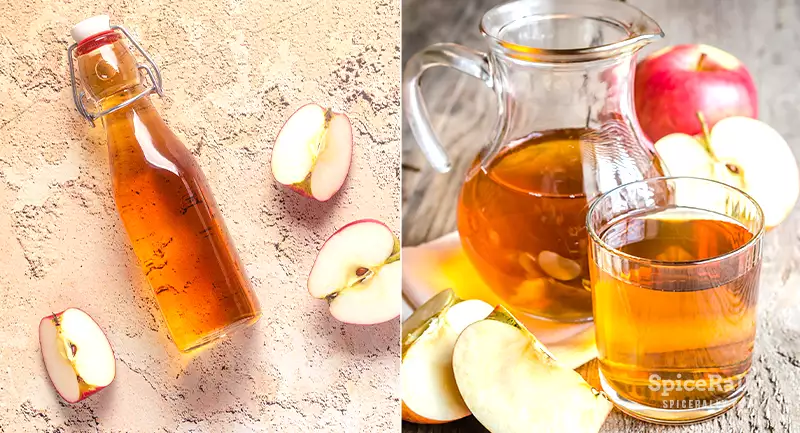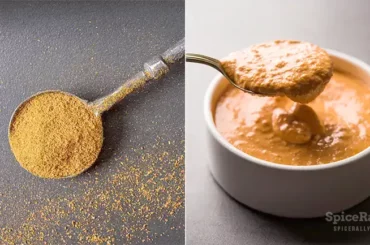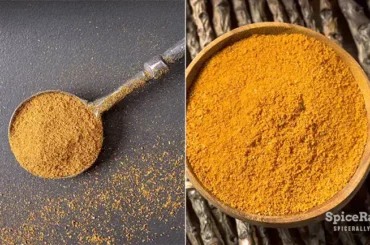Apple juice, apple cider, apple cider vinegar, and applesauce are all siblings of one family. But have you ever come to the point of thinking about how they would differ from each other? Thus, in this episode, we will be sharing facts about the difference between apple cider and apple juice.
The key difference between apple juice and apple cider comes down to their processing method. In fact, apple juice is typically pasteurized and well-filtered, with a longer shelf life even when kept at room temperature. At the same time, apple cider is usually unpasteurized, coarsely filtered, and needs to be refrigerated to keep it unperished.
So, continue reading if you are curious about discovering in what other ways these two drinks would differ.
Difference Between Apple Cider And Apple Juice
| Apple Cider | Apple Juice | |
|---|---|---|
| Base Ingredient | Apples | Apples |
| Other Ingredients | The ingredients are used in most homemade recipes and in some commercially made versions: – Spices (cloves, cinnamon, nutmeg, ginger, allspice) – Oranges – Brown sugar or other sweeteners like maple syrup, agave, etc. – Water | – Sweeteners (occasionally used) – Water – Added preservatives (in commercially made varieties) – Ascorbic acid (in some commercial brands) |
| Processing method | Usually unpasteurized and somewhat filtered (or not filtered). | Pasteurized and generally undergoes a vigorous filtration process. |
| Taste | It has a tangier, rich apple flavor than apple juice. | Smoother, lighter, and less tangy than apple cider. |
| Sweetness | Typically less sweet than apple juice if not any sweetener is added. | Usually sweeter than apple cider. |
| Color | Darker in color than apple juice. Has a cloudy, brownish tone. | Clear than apple cider. Has a less opaque, lighter, and diluted complexion. |
| Mode of serving | Served hot, warm, or chilled, depending on personal preference. | Usually served chilled or at normal temperature. Rarely enjoyed hot or warm. |
| Shelf life | – Perishable. – Should be refrigerated once opened. – It has a concise shelf life and should be consumed within seven to ten days. | – Perishes easily due to the preservatives added (applies to most store-bought varieties). – Refrigeration is not necessary. – Has an extended shelf life of up to one to two years. |
| Mode of production | Commercial and homemade | Commercial and homemade |
| Availability | – Mostly seasonal (prevalent in the fall) – Usually comes in bottles. – Can be purchased from grocery stores, supermarkets, and online sellers. | – Readily available throughout the year. – Comes in bottles and cartons. – Can be bought from supermarkets, grocery stores, and online shopping sites. |
| Nutritional Value | Apple cider is considered to have a more nutritional value (polyphenol compounds) and goodness of apples due to less filtration. | Most commercial apple juice varieties contain added preservatives and sugar. This also undergoes a thorough filtration process, so the nutritional value of apple juice can be somewhat lower than apple cider. |
What Is Apple Cider In A Nutshell?
So, apple cider is technically an unfiltered, less processed, and unpasteurized (mostly) version of apple juice. It is a popular drink, especially during the fall, served hot, warm, or cold.

Apple cider is easily perishable if not chilled. It will start to ferment and turn into apple cider vinegar or hard cider if left unrefrigerated for a long time.
However, even though typically apple cider comes as raw apple juice with pulp and residue that hasn’t been filtered, some filter it. Yet, it is not usually going through a strong filtration as apple juice would.
Apple Juice In Essence…
You can literally get apple juice any time of the year, and it is not a seasonal beverage. Sometimes, apple juice is sweetened using additional sweeteners. But usually, its sweetness is achieved naturally with the apples.
Moreover, apple juice is a highly processed beverage that typically undergoes powerful filtration until a clear drink is achieved. Apple juice can be made at home, but you will not get a clear juice like the store-bought ones.
In addition, most commercial brands add preservatives to apple juice to extend its shelf life. However, despite the fact that this is popular as a refreshing drink, it can also be useful in cooking and baking.
So, What Is The Actual Difference Between Apple Cider And Apple Juice?
If you referred to the table above, you might have gotten yourself clear that there are some distinctive differences between these two beverages. In fact, apple cider is less processed, filtered, and typically unpasteurized. While on the other hand, apple juice undergoes a vigorous filtration process and is pasteurized with added preservatives to have a longer shelf life.




